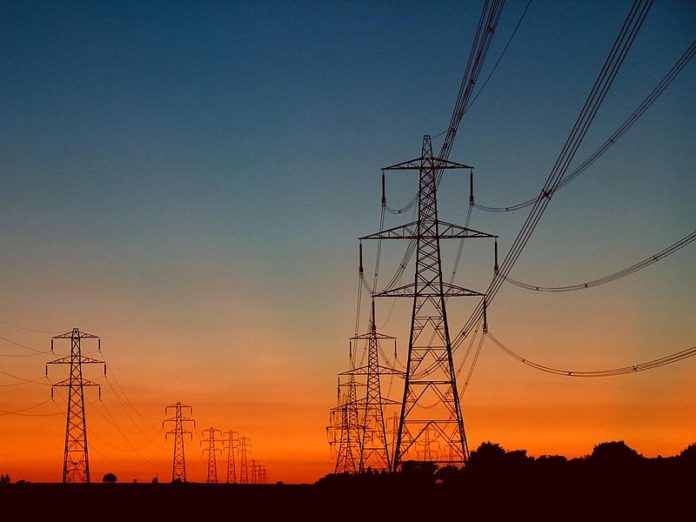A bill moving through the Legislature would expand efforts to discount high electric rates for companies moving to Kansas.
A bill set for a hearing in the House on Tuesday follows a recommendation in a recent electric rate study conducted by London Economics International.
The London Economics study suggested Kansas could attract more business by making electric rates more regionally competitive with discounts for big energy users.
The study noted that a number of surrounding states, such as Oklahoma, Missouri, Colorado, Arkansas, South Dakota and North Dakota, offer reduced electric rates as a development incentive.
“Kansas utilities need the flexibility to offer contract rates to help grow Kansas’ existing industries and recruit new ones into the state,” Kansas Commerce Secretary David Toland said.
“Growing the size of the pie — the number of industrial customers — is part of the strategy of bringing down rates overall,” Toland said.
The bill, approved unanimously by the Kansas Senate, is the Legislature’s latest effort to grapple with rising electric rates in Kansas.
The London Economics study commissioned by the Legislature found that Kansas had the highest average price in the region.
The average electric rates in Kansas in 2018 were higher than those in Arkansas, Oklahoma, Missouri, Iowa and Colorado.
The legislation, pushed by Evergy, has broad support from the economic development community.
Business recruiters say the state’s electric rates put Kansas at a disadvantage in the economic development game.
“The entire state can benefit from this bill to help attract large-scale economic development projects,” said Mitch Robinson, chief executive officer of the Salina Economic Development Organization.
Supporters point to Missouri as an example where a similar law on the books helped lure a $400 million, 250-job steel rebar manufacturing plant to Sedalia.
Opponents of the bill say there are “myriad” problems with the legislation, namely that it benefits the utility companies at the expense of the ratepayers.
They contend the utility companies, such as Evergy, would benefit from increased purchases in the long term even as ratepayers bear the cost of the development discount.
“It is unfair that Evergy could cause the problems associated with Kansas high utility rates, force ratepayers to pay for these problems and then reap the rewards generated by this bill,” Todd Love, attorney for the Citizens’ Utility Ratepayer Board, told lawmakers in testimony.
Evergy officials said the discounted rates won’t have an immediate impact on other customers because their rates are already set.
The company could recoup the costs the next time it returns to the commission for a rate review, but the increased sale of electric energy would be factored in.
“The driver behind economic development rates are that the permanent increase in sales provides lasting savings that benefit all customers,” Evergy spokeswoman Gina Penzig said.
The total system costs, she said, will be shared by a larger customer base, and the subsequent savings will be more than the temporary discount.
A coalition of big industrial power users has been at odds with utility companies over escalating rates in recent years.
The Kansas Industrial Consumers Group supports the bill but understands the concerns about the discount cost being passed on to customers.
The group backs the legislation because it believes the costs in the long run will be minimal when compared to the benefits of signing up more customers.
“We don’t think the costs are going to be enormous,” said Andrew French, a lawyer who represents the coalition.
“We do think it’s kind of necessary to get new people in the state,” he said.
The bill expands a program that’s already employed in Kansas.
Evergy, for instance, currently offers discounts in the Kansas City area to eligible businesses of an amount equal to one year of energy costs over five years.
It also requires a customer to use at least 55% of the energy that they would need at peak demand.
In the rest of what used to be Westar’s service area in Kansas, the company offers 75% of a year’s worth of energy over five years.
The bill, meanwhile, would authorize the Kansas Corporation Commission to approve special economic development rates to businesses under certain conditions.
The bill would extend a 20% average discount over five years to a consumer, such as a distribution center or a large hotel, that needs at least 200 kilowatts of electricity at peak demand.
It also would provide for an average of a 40% discount over five years to customers, such as a large manufacturing facility, that require at least 300 kilowatts at their peak.
In both cases, the customers are required to have received economic development incentives from one or more local, regional, state or federal agencies.
The bill also would allow state regulators to approve a negotiated discount for very large manufacturers — on the level of a Spirit AeroSystems, for example — if it could be shown the company would stop operation without the reduced rate.
The incentive for the very large 50 megawatt users would last 10 years, although the company could reapply for the incentive.
The discount for large customers would be available to businesses that would otherwise leave the area or cease operations. It also would be available to new businesses.
State regulators, under the bill, would have more discretion in approving discounts for the large energy 50 megawatt users than the smaller ones.
The legislation essentially standardizes the incentives across the state with an enhanced discount for the large 50 megawatt users as well as the 300 kilowatt users, Evergy officials said.
Evergy said the current discounts available to qualifying businesses in the area served under the old Westar brand are 25% less than what’s available in the Kansas City metro area.
As a result, the incentives have been more successful in the Kansas City metro area than in other parts of the Evergy service area.
The London Economics study found that incentives for electric rates can bring increased economic activity that produces jobs, capital investment and population growth that ripples through the economy.
It also said that new load added to the system through the incentives will broaden the customer base and help lower electric rates for everyone.
However, the study did point to drawbacks, as well.
The study noted setting high thresholds for eligibility could keep small, less energy-intensive businesses from accessing the rate incentives.
For example, Colorado only offers the incentive to 3 megawatt energy users, the highest threshold of all the states reviewed in the study.
“Small businesses are an important component of a thriving economy and setting high eligibility thresholds tends to overlook this need to attract small businesses to the local economy,” the London Economics study said.
The London Economics analysts also said it can be hard to ascertain whether a customer eligible for the discounted rates would have located in a particular area or expanded their business had the incentive not been offered to them.
The study raised a number of issues for states to consider as they craft incentives for electric rates. They include:
- Is the discount necessary to secure the customer? The study suggests requiring potential customers to demonstrate whether the discount is necessary, such as documenting communications with neighboring utilities scouting competing service, or financial reports demonstrating its financial distress or risk.
- Is the discount sufficient, or can it be minimized? “This particular consideration requires a subjective assessment on the part of the utility and/or regulator,” the study said.
- Does the incentive benefit all ratepayers? “Or, at the very least, are other ratepayers made no worse off by the implementation of the (incentives)?” The study notes that the additional customers attracted with the discount can reduce the contributions of all ratepayers in the system.
The study said states need to consider who pays for the discount.
It pointed out that other states have either required shareholders to absorb the discount or required it to be shared between the utility’s customers and its shareholders.
The study also suggested that the state should consider setting thresholds for job creation and capital investment when developing economic development discounts.
Critics of the bill say it doesn’t follow many of the guidelines for so-called economic development riders detailed by the London Economics Institute study.
“It makes little sense to retain a well-respected and knowledgeable source such as LEI to study and provide recommendations concerning EDRs in Kansas, and then ignore these recommendations,” Love said in his testimony.
“Yet, that is what (the bill) does,” he said.
The director of KCC’s utilities division acknowledged that while the bill, for instance, contains some eligibility requirements, they may not be as “robust” as what the study had envisioned.
But Evergy points out the bill requires smaller users — those needing 200 or 300 kilowatts — to qualify for development incentives available at the state, local and federal level.
Those incentive programs, Penzig said, already set out requirements for businesses to meet.
“Rather than define a separate layer of qualifications, we think it makes sense to leave this to the local and state experts in economic development,” she said.
The larger 50 megawatt customers aren’t required to have local tax incentives, and the bill lays out in broad terms what would be considered in evaluating a discount.
For the large companies, the KCC would be required to consider whether the discounted rates would be in “the interests of the citizens of the state generally in promoting economic development…”
Opponents of the bill, including the Kansas Corporation Commission, want the state to slow down and spend more time putting the discount program together.
They want policymakers to consider more of the guidelines that the London Economics suggested in its study.
“We’re supportive of economic development riders,” said Jeff McClanahan, director of the KCC’s utilities division.
“We just think that the stakeholders should meet and get together… (and) look more broadly across the country and determine best practices and come back with something that I think we’re all comfortable with,” he said.
















